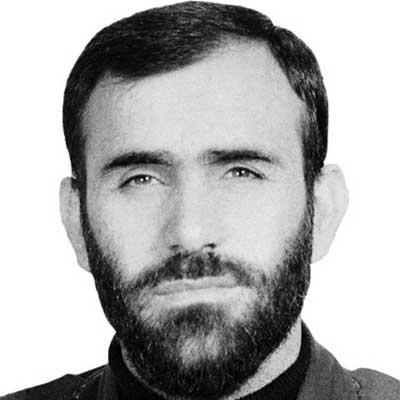Ahmadi, Seyyed Rahmatollah
Masoumeh Abedini
369 بازدید
Seyyed Rahmatollah Ahmadi (1969–2001) served as the head of the Office of the Representative of the Supreme Leader in the Logistics Command of the Islamic Revolutionary Guard Corps (IRGC) Ground Forces.
He was born on October 22, 1969, in the village of Koushk in Kohgiluyeh and Boyer-Ahmad Province. The year he was born, his village had just recovered from a drought, thus his father named him Rahmtollah, meaning mercy from God. From a young age, he would assist his father on the farm. He was in the second grade when the Islamic Revolution was victorious. Rahmatollah was determined to join the Iranian forces to help with the war effort even though he was still a child in elementary school.
Ahmadi wrote in his books at school: "The martyr is blessed, and martyrdom is eternal felicity". Because he was too young to participate in the war, Ahmadi forged his birth certificate and his ID to secretly travel to Yasuj to join the Basij forces there and undergo military training. When his father had discovered what Rahmatollah had done, he immediately went to Yasuj and brought Rahmatollah back home. Rahmatollah’s determination, eagerness, and persistence, however, wore his father down, eventually granting him permission to join the war efforts. And thus, on November 15, 1982, the thirteen-year-old Rahmatollah joined the front lines. A year later, he enlisted in the IRGC and remained on the western and southern fronts until the end of the war.
Seyyed Rahmatollah was proficient at launching RPGs and always volunteered to take part in reconnaissance missions. He treated others with humbleness such that he once kissed the feet of a comrade with whom he had a dispute seeking forgiveness. In the Sardasht region, Ahmadi established a special unit known as "Resalat" that was responsible for visiting combatants and attempting to boost their morale. He would personally go to operational zones to assist =soldiers.
In 1986, Ahmadi married his cousin but rejoined the frontlines just a few days later. Any time he returned home, he would make it a point to visit the families of his fallen comrades as well visit those who were impoverished. He would do whatever was in his ability to help alleviate their problems. He would constantly help others. For instance, there was a canal in front of his house that would fill with water during winter, making it difficult for people to cross the street. Rahmatollah built a wooden bridge over it so people could pass easily.
After commanding a company in the 19th Fajr Division, Ahmadi served as the deputy commander of the Ya Zahra Battalion of the 48th Fath Brigade during Operations Karbala 4 and 5. During Operation Karbala 4, when Iraq used chemical weapons against Iranian forces, he gave his gas mask to his comrades on several occasions, thereby saving lives at the cost of exposing himself to chemical injuries. He, however, never allowed anyone to discover his injuries. During Operation Nasr 4, when the Iranian forces had to pass through a snow tunnel, the cold weather caused him to start coughing repeatedly such that his face turned black. It was then that others realized that he had been chemically injured. Despite his illness, he was committed to fulfilling his duties to the best of his abilities.
He was injured a second time when shrapnel from an artillery shell struck his leg, but again he returned to the frontlines despite his injuries.
After the war ended, Ahmadi went to Tehran for treatment and became the head of the Office of the Representative of the Supreme Leader in the Logistics Command of the IRGC Ground Forces. By 2000, his physical condition had deteriorated, but he did not wish for even his closest relatives to know about his injuries. Despite the pain caused by his illness, he continued to work. His digestive system had been so damaged that he could not taste food. In addition to liver failure, he suffered from shortness of breath and a severe cough, yet carried on,m fulfilling his duties.
Although undergoing surgery helped him recover his health it did not last long. Subsequently, in 2001, Ahmadi underwent another surgery, followed by radiotherapy and chemotherapy.
Frequently going to hospital, long-term treatment, and insomnia made him weak, deteriorating his physical condition over time to such an extent, that he could no longer eat or even drink water. He had not had water for fifty days, his lips were dry and colorless, as he was coughing up blood. The treatments were ineffective, and his breathing difficulties and coughing worsened. Finally, on August 28, 2001, coinciding with the Fatimiyah mourning days, Ahmadi who had 70% disabled, attained martyrdom.[1]
In his will, we read: "Make your deeds, however small, sincere for God; for performing an act is easier than maintaining its sincerity. Know that sincerity of heart and intention prevents discord in which selfishness and following egos are rooted".
[1] A summary of an article published in the Sacred Defense Encyclopedia, Vol. 1, Tehran, The Center of Encyclopedia of the Sacred Defense Research Institute, 2011, Pp. 360-361.



